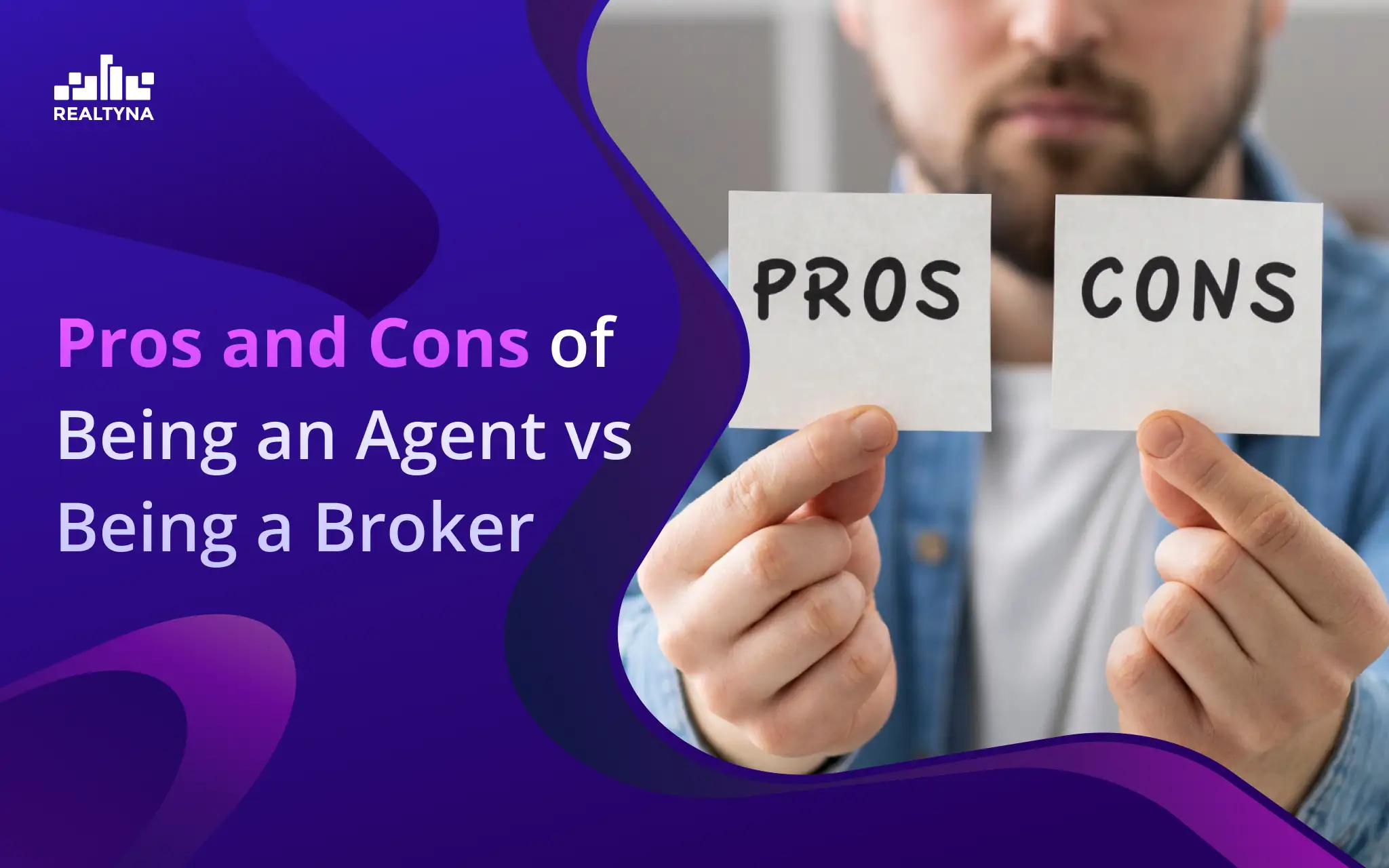
Real Estate Agent vs Broker: Understanding the Key Differences
You’ve likely heard the terms “real estate agent” and “broker” used interchangeably, but these roles are distinctly different.
Whether you buying, selling, or investing, knowing the nuances between these professionals can significantly impact your experience.
This comprehensive guide will demystify the roles of real estate agents and brokers, exploring their qualifications, responsibilities, etc.
Right now, let’s talk about job descriptions:
The Job Description of a Real Estate Agent

Real estate agents play a crucial role in the property market, acting as intermediaries between buyers and sellers.
Their primary responsibility is to facilitate smooth transactions while ensuring their client’s best interests are met.
Let’s delve into the key aspects of a real estate agent’s job description.
Client Representation and Negotiation
As a real estate agent, you’ll represent either buyers or sellers in property transactions.
For sellers, you’ll help determine an appropriate listing price, market the property effectively, and negotiate with potential buyers.
When representing buyers, you’ll search for suitable properties, arrange viewings, and negotiate purchase terms on their behalf.
Your negotiation skills will be put to the test as you work to secure the best possible deal for your clients. This often involves navigating complex discussions around price, contingencies, and closing dates.
Property Marketing and Showings
A significant part of a real estate agent’s role involves marketing properties to attract potential buyers. This includes:
- Creating compelling property listings with high-quality photos and descriptions
- Organizing and conducting open houses
- Scheduling private showings for interested buyers
- Leveraging various marketing channels, including social media and real estate websites
Market Analysis and Pricing Strategy
To provide value to your clients, you’ll need to stay up-to-date with local market trends and property values. This knowledge allows you to:
- Advise sellers on competitive pricing strategies
- Help buyers understand fair market value for properties they’re interested in
- Identify potential investment opportunities for clients
Now let’s talk about a broker.
The Job Description of a Real Estate Broker

Real estate brokers are seasoned professionals in the property market, operating at a higher level than agents. Their role encompasses a wide range of responsibilities, from managing teams to closing complex deals.
Advanced Licensing and Education
Real estate brokers have undergone additional training and education beyond that of a standard agent. This advanced knowledge equips them to handle more intricate transactions and provide expert guidance to both clients and agents under their supervision. Brokers must pass a more rigorous licensing exam, demonstrating their comprehensive understanding of real estate law, ethics, and business practices.
Management and Supervision
One of the key distinctions of a broker’s role is their ability to manage a real estate office. They often oversee a team of agents, providing mentorship, and training, and ensuring compliance with state and federal regulations. This managerial aspect requires strong leadership skills and a deep understanding of the industry’s best practices.
Independent Business Operations
Unlike agents who must work under a broker, real estate brokers can operate independently. They have the authority to start their own brokerage firm, hire agents, and manage the business aspects of real estate transactions. This independence comes with increased responsibilities, including handling trust accounts, maintaining records, and ensuring all operations adhere to legal standards.
Advanced Transaction Handling
Brokers are often called upon to handle more complex real estate deals. Their expertise is particularly valuable in commercial real estate transactions, property development projects, and high-value residential sales. They possess the skills to navigate intricate contract negotiations, resolve disputes, and provide strategic advice on market trends and investment opportunities.
Key Differences Between Agents and Brokers

Education and Licensing Requirements
Real estate agents and brokers differ significantly in their education and licensing requirements. Agents typically need to complete a pre-licensing course and pass a state exam to obtain their license. Brokers, on the other hand, must undergo additional education and experience. They’re required to complete more advanced coursework, often including business management, real estate law, and ethics. Brokers also need several years of experience as an agent before they can sit for the broker’s exam.
Scope of Responsibility
The scope of responsibility is another key differentiator between agents and brokers. Agents work directly with clients to buy, sell, or rent properties. They handle tasks such as listing properties, conducting showings, and negotiating deals. Brokers, however, have a broader range of responsibilities. They can perform all the duties of an agent, but they also have the authority to manage their own real estate businesses and supervise other agents.
Legal and Fiduciary Obligations
While both agents and brokers have legal and fiduciary responsibilities to their clients, brokers carry additional obligations. They’re responsible for ensuring that all transactions conducted by their agents comply with state and federal real estate laws. Brokers also bear liability for the actions of the agents working under them, making their role more complex and demanding from a legal standpoint.
Income Potential and Business Opportunities
The income potential and business opportunities available to brokers typically exceed those of agents. Brokers can earn money not only from their own real estate transactions but also from a portion of the commissions earned by the agents they supervise. Additionally, brokers have the option to open their own brokerage firms, providing them with greater entrepreneurial opportunities in the real estate industry.
Pros and Cons of Being an Agent vs Being a Broker

Advantages of Being a Real Estate Agent
As a real estate agent, you’ll enjoy a lower barrier to entry into the industry. The licensing process is typically quicker and less expensive than becoming a broker. You’ll also have more flexibility in your work schedule, allowing for a better work-life balance. Additionally, agents often benefit from the support and resources provided by their brokerage, including mentorship, training, and marketing materials.
Drawbacks of the Agent Role
However, real estate agents face certain limitations. Your income potential may be capped due to commission splits with your brokerage. You’ll also have less autonomy in decision-making and may need to adhere to the brokerage’s policies and procedures. Furthermore, agents cannot work independently and must be affiliated with a licensed broker.
Benefits of Becoming a Broker
Transitioning to a broker role offers several advantages. You’ll have the potential for higher earnings, as you can keep a larger portion of commissions and even earn overrides from agents working under you. Brokers enjoy greater autonomy and can open their own brokerage firms. This position also comes with increased prestige and credibility in the industry.
Challenges of the Broker Position
Despite these benefits, being a broker comes with its own set of challenges. The licensing process is more rigorous and time-consuming, requiring additional education and experience. Brokers also face increased liability and responsibility, as they’re accountable for their agents’ actions. Managing a brokerage adds administrative duties and overhead costs, which can be stressful and time-consuming.
It’s done.
We cover the most important differences between an agent and a broker.
Whether you’re considering a career in real estate or seeking professional assistance for a property transaction, recognizing these differences will help you make informed decisions.
Ultimately, both agents and brokers work towards the common goal of facilitating successful real estate deals for their clients.


Sorry, the comment form is closed at this time.